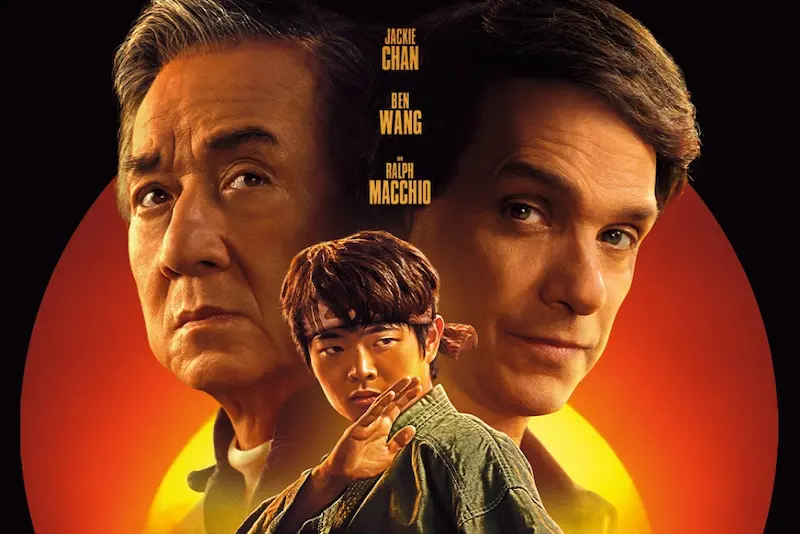
One of the most powerful aspects of Karate Kid: Legends is its commitment to cultural fusion
Release Date: July 18, 2025
World Premiere: TCL Chinese Theatre, Hollywood, California
Directed by: Jonathan Entwistle
Starring: Jackie Chan, Ralph Macchio, Ben Wang, Sadie Stanley, Ming-Na Wen, Joshua Jackson
The Return of the Masters: Chan and Macchio Reignite the Flame
In a cinematic moment fans never thought they’d see, Karate Kid: Legends brings together two martial arts icons, Jackie Chan and Ralph Macchio, for the first time on screen. The film, released globally on July 18, 2025, premiered to a packed house at the TCL Chinese Theatre in Hollywood, where cheers erupted as the duo walked the red carpet side by side.
Table of Contents
Chan reprises his role as Mr. Han from the 2010 reboot, while Macchio returns as Daniel LaRusso, the original Karate Kid. Their chemistry is electric, blending wisdom, humor, and grit in a way that bridges generations. The film doesn’t just rely on nostalgia—it reinvents it.
Set in modern-day New York, the story follows Li Fong, played by rising star Ben Wang, a kung fu prodigy who relocates from Beijing after a personal tragedy. Struggling to adapt, he finds himself caught between cultures, philosophies, and rival martial arts schools. Enter Mr. Han and Daniel LaRusso, two mentors from different worlds who unite to guide him.
Their dynamic is more than just mentorship. It’s a philosophical clash between kung fu’s fluidity and karate’s discipline. Yet, through shared values of honor and perseverance, they forge a new path for Li, one that transcends style and speaks to the soul of martial arts.
A Story of Identity, Conflict, and Redemption
Karate Kid: Legends isn’t just a martial arts movie, it’s a coming-of-age tale wrapped in emotional depth and cultural nuance. Li Fong’s journey is raw and relatable. After losing his father, he moves to New York with his mother, Dr. Fong (played by Ming-Na Wen), a brilliant but emotionally distant scientist. The city is unforgiving, and Li quickly finds himself at odds with Victor Lipani (Joshua Jackson), a local karate champion with a chip on his shoulder.
Victor’s daughter, Mia Lipani (Sadie Stanley), adds complexity to the narrative. She’s smart, rebellious, and drawn to Li’s quiet strength. Their relationship becomes a subtle thread of hope and tension, as Mia challenges both her father’s worldview and Li’s guarded heart.
The film explores themes of grief, cultural displacement, and the search for belonging. Li’s struggle isn’t just physical, it’s internal. He’s torn between honoring his father’s kung fu legacy and adapting to a new world that doesn’t understand him. Mr. Han teaches him patience and flow, while Daniel instills discipline and strategy. Together, they help Li discover that true strength lies not in fists, but in balance.
The climactic showdown at the All-State Martial Arts Championship is a masterclass in choreography and emotion. Li faces Victor in a brutal, high-stakes match that tests everything he’s learned. But it’s not just about winning—it’s about proving to himself that he belongs.
Bridging Cultures, Breaking Barriers
One of the most powerful aspects of Karate Kid: Legends is its commitment to cultural fusion. By bringing together kung fu and karate, East and West, the film sends a message that unity is possible—even in conflict. It’s a timely reminder in a world often divided by borders and ideologies.
Director Jonathan Entwistle deserves credit for crafting a narrative that respects both traditions without diluting either. The film doesn’t shy away from the differences between kung fu and karate, it celebrates them. Mr. Han’s poetic movements contrast beautifully with Daniel’s sharp techniques, and their mentorship styles reflect their philosophies.
The cinematography captures this duality with elegance. Scenes in Chinatown are rich with color and tradition, while the dojo sequences in Brooklyn are gritty and grounded. The soundtrack blends traditional Chinese instruments with modern hip-hop beats, creating a sonic landscape that mirrors Li’s journey.
Critics have praised the film’s authenticity and emotional resonance. While some argue that the pacing lags in the second act, most agree that the payoff is worth it. The final 20 minutes deliver a cathartic blend of action and heart that leaves audiences cheering and tearing up.
Legacy Reborn: Impact and Future of the Franchise
With a box office haul of $106 million in its opening weekend, Karate Kid: Legends has proven that the franchise still packs a punch. But its success isn’t just financial, it’s cultural. The film has reignited interest in martial arts among younger audiences and sparked conversations about mentorship, resilience, and cross-cultural understanding.
Jackie Chan and Ralph Macchio have hinted that this may not be their last collaboration. Rumors swirl about a potential sequel or even a crossover with the Cobra Kai universe. Ben Wang, meanwhile, has emerged as a breakout star, praised for his emotional depth and physical prowess.
The film’s impact extends beyond the screen. Martial arts schools across the U.S. and China have reported increased enrollment, and social media is flooded with fan art, training montages, and heartfelt tributes. Karate Kid: Legends has become more than a movie, it’s a movement.
In a time when the world feels fractured, this film reminds us that strength isn’t about domination—it’s about connection. Whether you’re a lifelong fan or a newcomer, Karate Kid: Legends offers a story that kicks hard, heals deep, and stays with you long after the credits roll.
Also read – “The Roses” Twists Romance into a Beautiful Heartbreak – Love in Bloom or Ruin?
1 thought on ““Karate Kid Legends” Unleashed – A Bold Comeback That Kicks Nostalgia and Unity Into High Gear”
Comments are closed.